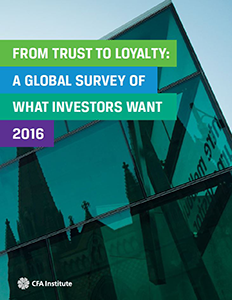From Trust to Loyalty: Four Ways to Close the “Trust Gap” with Investors
CFA Institute partnered with the PR firm Edelman in early 2016 to publish From Trust to Loyalty: A Global Survey of What Investors Want. The study surveyed 3,312 retail investors and 502 institutional investors in North America, Europe, Asia, and Australia to gauge how much they trust the financial services industry and whether their needs as investors are being met.
The Investment Adviser Association and CFA Institute hosted a webinar — Building Client Trust and Loyalty by Closing the Expectations Gap — during which panelists offered their insights on the study’s findings and the relevance of the findings to client relationship management. Panelists included
- Karen L. Barr, President and CEO, Investment Adviser Association (moderator)
- Diane Garnick, Chief Income Strategist, TIAA
- Kurt Schacht, CFA, Managing Director, Standards and Advocacy, CFA Institute
- Loraine B. Tsavaris, Managing Director, Rockefeller & Company
The results were, in part, a word of caution to the financial services industry, calling attention to a very troubling disconnect. The study revealed a gap between what clients expect and what investment advisers actually deliver. Because the financial services industry is built on finding and maintaining client relationships, any mismatch between clients’ interests and advisers’ goals can lead to a loss of trust, loyalty, and eventually, the client’s business.
The days of using only performance based standards to measure the success of the investment management industry are long gone. The From Trust to Loyalty survey highlighted that although underperformance is a major influencing factor of client satisfaction, other elements, such as fees, confidentiality, and communication, also cause investor loyalties to waiver. Schacht indicated that investment managers are in a precarious position in that only half of all clients would recommend their current manager. Mixed loyalty does not bode well for firms because it leads to trouble with both client attraction and retention. Investor loyalty should never be taken for granted.
The following are four practical ways the panelists suggested that investment professionals can build client trust going forward.
1. Demonstrate Your Crisis Preparedness
Client loyalty may be in jeopardy during a time of crisis. The survey found that 27% of investors would re-evaluate their manager based on performance through a financial crisis. A large portion of investors are also still wary that another crisis may soon occur and have serious doubts that their investment firm is prepared for such an event.
Tsavaris proposed that although the role of the individual adviser as a guiding light through a financial storm has its merit, the role of the firm should take priority. The firm’s reputation and how it has handled a crisis in the past are critical indicators of future performance and its overall crisis preparedness. Any crisis strategy a firm may have needs to be effectively and consistently communicated to ease each individual investor’s concerns. “It comes down to good communication practices for a firm to be effective and give sound advice during a crisis,” she said.
2. Adapt to Millennials’ Preferences
Millennials may not yet be a large contributor in the investment industry, but in time they will be a demographic worth adapting approaches for. As they start investing, millennials will want to use the ease of digital investment platforms given their comfort with technology. Barr believes that although millennials will always want technological advances, as their financial situations grow in complexity, they are going to want human interaction.
As part of this generation myself, I understand the attractiveness of fintech and robo-advisers for investment management. The ease and convenience of such platforms and technology are strong motivators for my generation, and in general, we have very short time horizons. I see advisers adding value by still having that personal manager/client relationship, especially for major life event planning (retirement), but doing so in tandem with emerging financial technology.
3. Conduct Annual Investor Checkups
Building and maintaining a solid manager/client relationship is no easy task. Investment managers need to focus on a client’s financial well-being even more than relative performance to a benchmark. Garnick suggested that a clear way to communicate this focus is through an annual investment/retirement checkup. Financial advisers, like doctors, should be able to have tough conversations with clients in relation to their investment goals. “The sooner we begin to do this, the higher credibility we will have in the community,” she said. We can’t always be popular with our clients, and sometimes the best advice is something they may not want to hear, but doing so begins to rebuild trust in the financial industry.
4. Make Communication a Two-Way Street
When taking on a new client, it is paramount that advisers take time to better understand their individual needs and financial goals. Firms can often be too metrics driven, focusing on returns over investor needs. “You can beat the benchmark every year and not meet your client’s objective,” noted Garnick.
Understanding goals becomes even more difficult if clients cannot fully articulate their objectives. Accurately assessing an investor’s needs contributes to the overall value delivered to the client. Panelists recommended that reframing the questions you ask and restating the client’s initial requests will increase client comprehension.
Tsavaris stated, “It is essential to relentlessly communicate not just what is being done, but why it’s being done in ways that engage the client so they can clearly see the benefit of the outcome.” Client engagement through direct and thorough communication of both the process and outcome leads to increased investor trust and loyalty.
From Trust to Loyalty: A Global Survey of What Investors Want was published as part of the Future of Finance initiative, a long term, global effort by CFA Institute to shape a trustworthy, forward-thinking investment profession that better serves society.
If you liked this post, consider subscribing to Market Integrity Insights.
Image Credit: CFA Institute

